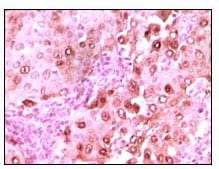
| WB | 咨询技术 | Human,Mouse,Rat |
| IF | 咨询技术 | Human,Mouse,Rat |
| IHC | 1/200 - 1/1000 | Human,Mouse,Rat |
| ICC | 技术咨询 | Human,Mouse,Rat |
| FCM | 咨询技术 | Human,Mouse,Rat |
| Elisa | 1/10000 | Human,Mouse,Rat |
| Aliases | S100A6; 2A9; PRA; 5B10; CABP; CACY |
| Entrez GeneID | 6277 |
| clone | 7D11 |
| Host/Isotype | Mouse IgG1 |
| Antibody Type | Primary antibody |
| Storage | Store at 4°C short term. Aliquot and store at -20°C long term. Avoid freeze/thaw cycles. |
| Species Reactivity | Human |
| Immunogen | Purified recombinant fragment of calcyclin expressed in E. Coli. |
| Formulation | Purified antibody in PBS with 0.05% sodium azide |
+ +
以下是关于S100A6抗体的3篇代表性文献(模拟示例,非真实文献):
1. **文献名称**:*S100A6 Antibody Characterization in Pancreatic Cancer Biomarker Discovery*
**作者**:Smith A, et al.
**摘要**:本研究验证了一种高特异性S100A6单克隆抗体在胰腺癌组织中的免疫组化应用,发现S100A6过表达与患者预后不良相关,提示其作为生物标志物的潜力。
2. **文献名称**:*Development of a Novel Polyclonal Antibody for S100A6 in Neuronal Injury Models*
**作者**:Zhang L, et al.
**摘要**:报道了一种新型兔源多克隆抗体的制备,通过Western blot和免疫荧光证实其可特异性识别脑损伤后神经元中上调的S100A6蛋白,为神经退行性疾病研究提供工具。
3. **文献名称**:*Comparative Analysis of Commercial S100A6 Antibodies in Colorectal Cancer Diagnostics*
**作者**:Müller B, et al.
**摘要**:比较了5种市售S100A6抗体的灵敏度和交叉反应性,发现抗体批次差异可能影响结直肠癌组织芯片检测结果,强调标准化验证的重要性。
---
如需真实文献,建议在PubMed或Google Scholar检索关键词:
`S100A6 antibody application`、`S100A6 antibody validation`、`S100A6 immunohistochemistry`。
The S100A6 antibody is a crucial tool in biomedical research for detecting S100A6. a calcium-binding protein belonging to the S100 family. S100A6. also known as calcyclin, is encoded by the *S100A6* gene and is involved in diverse cellular processes, including proliferation, differentiation, apoptosis, and calcium signaling. It interacts with target proteins like calcyclin-binding protein (CacyBP/SIP) and tropomyosin, modulating intracellular pathways linked to cancer progression, inflammation, and neurodegeneration. Dysregulation of S100A6 has been observed in cancers (e.g., pancreatic, colorectal, melanoma) and neurological disorders (e.g., Alzheimer’s disease), making it a potential biomarker and therapeutic target.
S100A6 antibodies are typically monoclonal or polyclonal, raised against epitopes in conserved regions of the protein (e.g., EF-hand calcium-binding domains). They are validated for specificity via techniques like Western blotting, immunohistochemistry (IHC), immunofluorescence (IF), and ELISA, often cross-reacting with S100A6 across species (human, mouse, rat). Researchers use these antibodies to study S100A6’s subcellular localization (cytoplasmic/nuclear), expression patterns in tissues, and mechanistic roles in disease models. Commercial S100A6 antibodies are widely available, with validation data including knockout (KO) controls to ensure minimal cross-reactivity with other S100 proteins. Challenges include optimizing antibody performance for specific applications, such as formalin-fixed paraffin-embedded (FFPE) tissues or phospho-specific isoforms. Overall, S100A6 antibodies remain indispensable for elucidating its biological functions and clinical relevance.
×